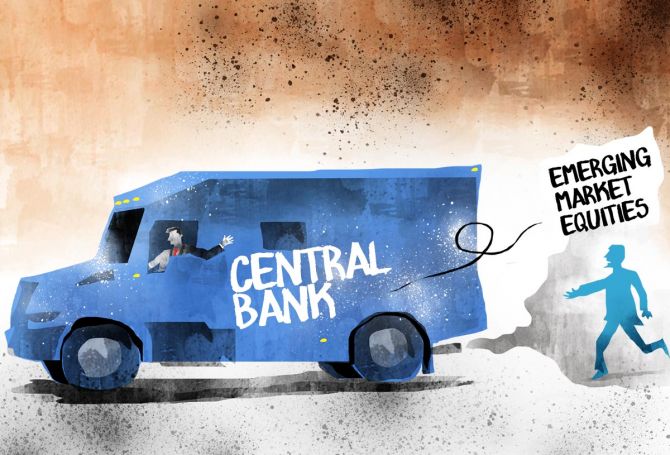 | « Back to article | Print this article |

Emerging Market (EM) equities that have been accustomed to the 'easy money' policy of the major global central banks to stem the impact of Covid pandemic in the past 18 months may come under pressure over the next few months, as these central banks begin to unwind their policies, said analysts.
While the US Federal Reserve (US Fed) has announced a faster tapering (starting January) of its asset purchase programME amid rising inflation, the Bank of England (BoE) hiked its main interest rate to 0.25 per cent as inflation pressures mounted -- the first major global central bank to hike rates since the Covid pandemic hit in 2020.
Globally, the biggest risk for the markets, analysts said, will stem from the US Fed beginning to reduce the size of its balance sheet.
The development, they believe, may not be fully priced in by the markets yet and can impact EM liquidity.
"If conditions persist, the US central bank may not only hike rates but also begin the process of allowing bonds that it holds to mature and/or selling bonds to reduce the size of its balance sheet. This scenario is not priced in the markets and will be a big scare for risk assets, especially in EMs, which have been a beneficiary of global liquidity," said Arvind Chari, chief investment advisor at Quantum Advisors.
As regards India, foreign institutional investors (FIIs) have pumped in over Rs 34,400 crore/Rs 344 billion ($4,900 million) in the Indian stocks in calendar year 2021 (CY21).
Their contribution, along with strong participation by retail investors and domestic institutional investors (DIIs) has taken the frontline indexes - the S&P BSE Sensex and the Nifty50 -- over 20 per cent higher in CY21.
"Typically, the emerging markets underperform their developed market (DM
While most analysts see monetary policy normalisation across the world in 2022, rate trajectories are likely to diverge across geographies, they said.
Those at Credit Suisse expect the US Fed to start hiking rates in late 2022, while the ECB is likely to keep rates unchanged.
"Monetary policy should stay unchanged in Japan and Switzerland. In the UK, where inflation is a bit stickier than in the rest of Europe, we expect the Bank of England to do two more hikes in 2022. Also see rate hikes in certain emerging markets, including Brazil," said Michael Strobaek, global chief investment officer at Credit Suisse.

BNP Paribas, too, expects the DMs to outperform their EM peers and the potential migration of investment to safe-haven assets, largely DM stocks and bonds.
'EM could underperform DM as Fed tightening drives funds to safe-haven assets. Within EM, Asia should outperform, with better corporate balance sheets and a stable EPS growth profile. We forecast a slight de-rating for India and assume all other markets to trade at their current P/BV levels,' wrote Manishi Raychaudhuri, head of Asia-Pacific equity research, BNP Paribas in a recent report.
Some analysts, however, still have some doubts about the Fed's resolve and say continuing asset purchases for three more months, and following that up with three hikes before 2022-end, when CPI inflation has already jumped to 6.8 per cent, can hardly be called hawkish.
'This is probably the most dovish Fed since the 1970s and it remains to be seen whether they will have the stomach to deliver those three hikes that are now in the dot plot,' said Philip Marey, senior US strategist at Rabobank International in a recent note.
Feature Presentation: Aslam Hunani/Rediff.com